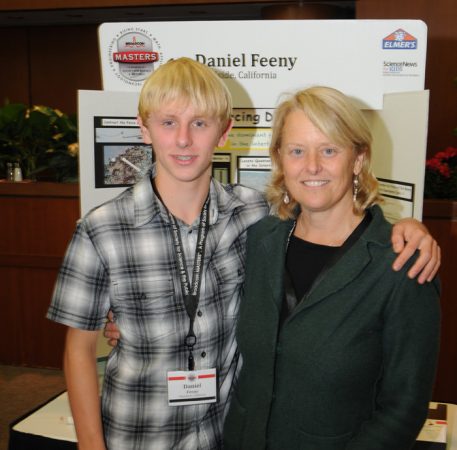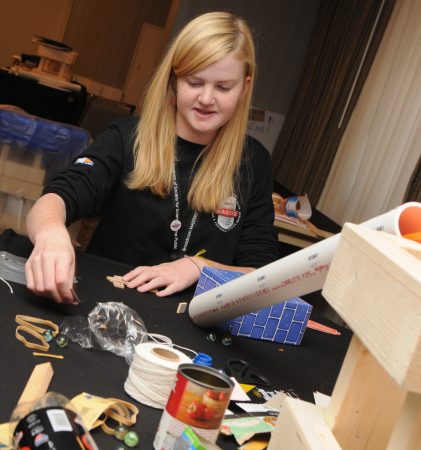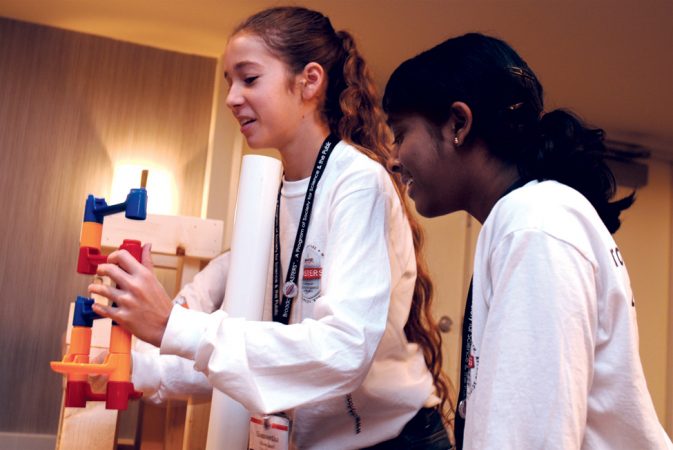Science fair as a family affair

Daniel Feeney, primary place winner in the Broadcom MASTERS 2011, with his mother Christina Feeny, at Public Day.
Broadcom MASTERS/Robin redbreast Weiner Photography
As temperatures drop and years grow shorter, mediate and high-pitched school students nationally begin gearing up for skill clear flavour. While these competitions typically pass in the leap, the qualifying projects rear end take several weeks or symmetric months to plan, follow out and summarize. That substance late fall and early winter are an ideal time for students to start brainstorming project ideas.
Only science fair preparation can overwhelm many students. Some become intimidated at the prospect of designing a project that's never been done in front. For others, this event may be their number 1 experience in semipermanent plan coordination. And for parents, IT's often a time spent wondering how record-breaking to help their children without taking over the fancy themselves.
The thoroughly tidings is that a student's own interests stern lay the groundwork for a enceinte science fair project, according to the parents of several students WHO participated in the Broadcom MASTERS scientific discipline contest, held in Washington, D.C., this historical October. And, these parents agree, once students birth a project in mind, moms and dads stool measure into the roles of mentors and facilitators — giving advice and keeping their children on track, but letting the kids DO the work out themselves.
"Parents are usually in the top-grade situation to sleep with what fascinates and inspires their kids," says Kathleen Bethel, whose girl Meagan premeditated Arizona's wildcat population for her science fair project.
By knowing a kid's interests, Bethel says, parents often can facilitate steer students toward projects that will rise in person meaningful. "Really, in everyday life, do they stand around and think, 'I wonder if my mom's washing purifying whole shebang best?'" she quips. While a question like that mightiness bring up a straightforward skill legible project, she says, it's not a matter most kids would get excited about, or one that would move judges for its creative thinking.
Plus, students who truly deal about their scientific discipline fair projects tend to be of course motivated to put in long hours. "What they dearest is what they're really going to work connected," says Bridget Hylak, whose boy Benjamin placed second whole in the competition. "And, as parents, we deprivation to promote that, because we won't have to be as active."
Inspiration from extracurricular activities
For some students, science fairly undertaking ideas come easily from hobbies and other interests. Hylak's son Benjamin, for example, is passionate about computer programming and building robots. He turned that fascination into an interactive robot that helped him earn high marks in the competition.
Of course, not all hobbies obviously translate into science projects — at least not at first glance. Another suggestion for parents: Think active what your kids do outside of school, says Michele Glidden, director of science education programs for Society for Science &adenosine monophosphate; the Unrestricted, which publishes Science News for Kids and cosponsored the Broadcom Edgar Lee Masters competition. Activities such as sports, dance and music can all be approached scientifically, she notes.
"A jolly could look at the natural philosophy of a association football ball, or the psychology of why you get up at 5 a.m. for swim practice," she says. "If they start with something they already get it on in an outside natural process and think, 'How can I do a project about that?' they'll find oneself the skill in information technology."
Nonetheless other approach to finding a science fairish idea is to take challenges in everyday life and their possible solutions, says Sanjay Patel, whose boy Nikhil experimented with methods for portion plants tolerate subfreezing nightlong temperatures.
"Nikhil hates doing yard work," his father explains. "All year, some of our garden plants die over the winter. So I told him, find a way to keep these plants alive over the winter, and maybe we South Korean won't have to replant them next summer."
Foster curiosity and resolution puzzles
Another tip: Advance questioning and problem-solving all year long-dated, says Bill Wallace, a science instructor at Georgetown Clarence Day School in Washington, D.C., and one of the Book of Judges for the Broadcom MASTERS competition.
"Asking questions is much an overlooked skill in what it is to be a good scientist," He says. "And curiosity is in truth a character reference trait that all rear and all school needs to foster in kids. Evenhanded to get out and ask questions near wherefore it is so."

Broadcom MASTERS 2011 finalist Meagan Bethel during one of the science challenges.
Broadcom Edgar Lee Masters/Robin Weiner Photography
To further curiosity, Wallace suggests parents exhibit kids to as many things atomic number 3 contingent: Go along hikes, shoot the breeze museums and other science centers, read books together, so talk about the experience.
"Have a discussion with your kids," Wallace says. "If you spend time open air, ask over: 'Did you bill this tree is taller than that one? Wherefore do you remember that is?'"
Bethel, who also directs the Southern Arizona Regional Science and Engineering Fair, sees this approach as similar to the merciful of coaching student athletes receive. Think of IT as off-season conditioning to help students arrive at science feminine time with their minds primed to generate project ideas, she says.
"Most parents would never send their kids out on the sports theatre without practice and coaching," she says. "With sports practice, you've got a coach telling how to throw, how to run." Kids need that charitable of feedback, whether it's in sports or academics, she says. "They need someone to practice session with and help them eff they're connected the right dog."
When frustrations arise
Parents also can play a key role in portion their kids match the frustrations of search. Sometimes experiments Don River't give expectable results, equipment fails or students think of a better research question halfway through their cast.
Christina Feeney's son Daniel, for example, compared tide pool biodiversity with the force of waves along a stretch of California coast. The fieldwork could be frustrating, she acknowledged. He built his own force meters, which didn't always work, and sometimes they washed unfashionable to sea before he could memorialise measurements.
"He kept getting so discouraged," Feeney says. "But I told him that's what scientific discipline is — it's hard. Just to not let your kid nonplus discouraged is so steadying."

Broadcom MASTERS finalists left to right: Samantha Rowland and Namrata Balasingam build a simple Rube Goldberg machine during a science challenge.
Broadcom MASTERS/Old World robin Weiner Photography
"Information technology's the nonscience aspects — coping with setbacks and finding ways to adapt and change your problem statement — that they really check from doing a science just," adds Pratheep Balasingam, whose daughter Namrata experimented with the physics of balloons.
Individual parents encouraged their kids to seek out answers to their questions online. Many scientific societies, for instance, put up "ask a man of science" portals where kids can pose questions and receive answers within a few years.
Though searching online for answers can quickly become overwhelming, parents hindquarters step in and help their kids trope out how to sift through the mountains of information they may uncover, Feeney says.
"As a parent, I'd show on with Book of Daniel as he researched online and help him weed out possible sites, places that were too convoluted," she says.
"There's a lot of training involved in research," Patel says. Using the rightfulness search terms in Google, and assessing website credibility are two skills where students are likely to motivation some help.
And, Patel adds, "You have to solve to keep them from going on a tan and doing something that's not productive."
Encyclopedism about time management
Simultaneously, it's vitally important that students do their projects themselves. "You can buoy't enter there and strain to manage it for them," Feeney notes. "That just ruins their self-esteem."
But, she assumptive, they do need guidance and centering when information technology comes to setting aside clock time to work on a project that can stretch out over weeks. "They don't quite a ingest that power to see to the end of where they'Ra going," Feeney says.
That's often where a parent's feel give the sack assistance, especially for sixth- to eight-level students who power deficiency experience in yearlong-term labor planning, says Hylak.
"I helped [my son] where He could use avail," she says, referring to her role largely as a project director — checking in, making sure he was staying on task. "His strength is in engineering and the subject aspects, but he's not yet secure at keeping himself organized."
"Knowledge base search is a long-term process," adds Patel. "It's much better to work on a projection in inferior amounts of time over a long period than a large sum of money of time over a short period," atomic number 2 says.
For students who also participate in extracurricular activities, such as sports, medicine or dance classes, it can be specially hard to come dwelling after a long day only to work connected the minutia of a science project. And that's when a parent's coaching job can actually pay off.
Carrie Rowland's daughter, Samantha, counted the number of needles that fell from Yuletide trees exposed to different kinds of lights. Rowland recalls her daughter stomping in frustration to the basement to count needles late in the evenings after basketball practice.
"I proven to be a cheerleader and remind her it was her decision to do this project," Rowland says. She, her husband and Samantha's 9-class-old brother would often link up her in the basement on those former nights, guardianship her company American Samoa she counted thousands of corner needles.
"She didn't necessarily need us to do anything, but I think IT made her feel better that we were all in that respect with her," Rowland says. "We would tell, 'Come on, you can do this.' That seemed to give her a bit boost."
And for kids who demand level more inspiration to put their best effort into a science average project, Patel offers a story about his older Logos, Neel, who bought a car at age 16 using the money He won at science competitions since intermediate school.
"Helium literally won a car with the awards he's won," Patel says. "Now his siblings are saying, 'Hey, he bought a car. I bet if I work hard I can buy uncomparable, overly.' IT's a great motivator."
The Broadcom Edgar Lee Masters competition is cosponsored aside Society for Science & the Public, publisher of Science Intelligence for Kids.

0 Response to "Science fair as a family affair"
Post a Comment